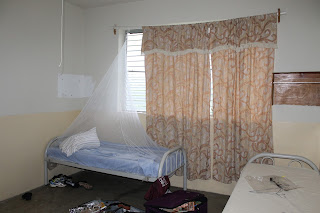I asked someone the other day what they did for fun on the
weekends: “Well, I usually go to church.” Church is not a one hour on Sunday
morning thing around here: Haitians go to church for fun, worship, and
community. Many people have invited me to join them at church (hence the title).
My home parish here is The Episcopal Church of Sainte Croix.
It is right next to the hospital and has its own school attached. The earthquake
of 2010 razed both the church and the school. The people decided that it was
more important to prioritize the building of the school first (a decision I
entirely agree with), so worship is held in a temporary tin-roof structure with
open sides. It is a friendly and welcoming congregation of about 100 people. My
first Sunday here they were talking about me and my projects for about 5 minutes before the person
next to me leaned over and translated from Creole to French---oops! Get
excited, the feast day of Sainte Croix is in two Sundays and there are
preparations under way for a great celebration!
I was invited by Madame Dominique, the “House Mom,” to join
her at the Catholic church one night. The Catholic Church used to be the main
landmark of Leogane until it too was razed. All that remains is the stunning mosaic
altar and a large congregation that shares a tarp-covered structure with the Presbyterians
next door.
Finally, last night I went with one of the teachers here to the Youth Night at the Baptist Church. We sang, we danced, we played hot potato, it was quite fun! “Youth” for them is basically anyone: the president of the Youth is married with two children!
So between these experiences, a few things that I have picked
up about church in Haiti:
1) Toddlers run the place. Literally. They just
toddle around, being picked up by whoever and entertaining everyone, until the Eucharist
starts and they are secured to a seat
2) It is long. Sunday liturgy is two and a half
hours: church is what you do on Sunday
3) It is in French and Creole: The Book of Common
Prayer is in French, so the traditional prayers are in French but most of the other
prayers, the sermon, and the announcements are all in Creole. Hymns are half
and half.
4) Everyone sings loudly. None of this quietly
humming to yourself stuff: you are part of a choir!
5) You will
be asked to introduce yourself at any new church you go to… start practicing
your Creole!
Now we are starting off a new week here at the school! I am
halfway through the summer Biology class that I am teaching. Teaching biology
in French has been a challenge in preparation (believe it or not, they don’t
teach you the vocabulary for “hypophyseal portal system” in French classes) but
a joy to teach!


